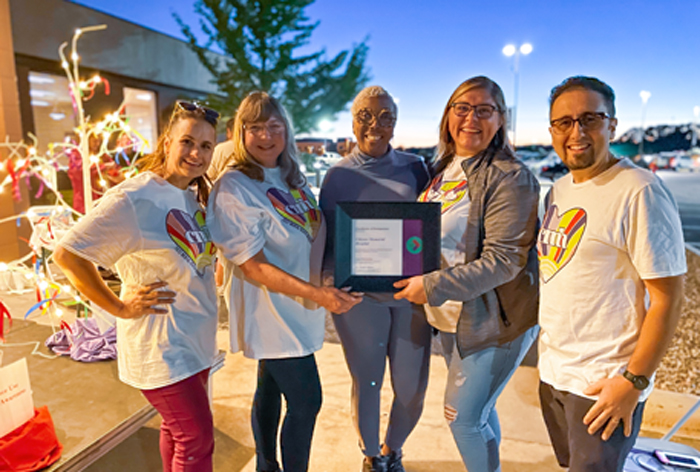CMH Addiction Recovery Program
- Need: To help individuals and families impacted by substance use disorder access treatment and counseling in rural Missouri.
- Intervention: The CMH Addiction Recovery Program provides medication-assisted treatment, counseling, peer and family support, and other related services within a Rural Health Clinic.
- Results: The program operates 5 days a week and sees 400 patients each month.
Description
The CMH Addiction Recovery Program in rural Bolivar, Missouri, is an outpatient treatment program for people with substance use disorders such as opioid and alcohol use. The program is run through Butterfield Park Medical Center, a Rural Health Clinic (RHC).
The program has a physician board certified in family medicine and addiction medicine, 2 nurse practitioners, a case manager, a nurse, a full-time counselor, and a peer support specialist (PSS). The RHC in Bolivar is the hub but sends a medication-assisted treatment (MAT) provider to other RHCs in El Dorado Springs, Hermitage, Osceola, and Stockton for treatment and counseling.
The program has been funded through third-party reimbursements (Medicare, Medicaid, and private insurance) as well as Health Resources and Services Administration (HRSA) grants: HRSA 2021 Rural Communities Opioid Response Program - Implementation Award and the HRSA 2023 Neonatal Abstinence Syndrome Award.
Services offered
- Medication-assisted treatment, including naltrexone, acamprosate, and buprenorphine
- Nicotine replacement products
- Counseling
- Individualized and cognitive behavioral therapy
- Family support
- Peer support
- Case management
The program also offers contingency management, in which patients receive sobriety coins or other tokens at different milestones: at the beginning of treatment, 90 days, 6 months, and every year. Children of patients may also receive a gift or token. After a year of treatment, patients have the option to ring a bell in the clinic and receive a certificate, T-shirt, and picture. Families are invited to celebrate with the patient.
Results
The program had 15 patients in the first month (January 2018) and was open two days a week. Now, the program operates 5 days a week and sees 400 patients each month.
Since the program began offering contingency management, no-show rates for appointments have decreased.
The program worked with county administrators to start a Co-Occurring Treatment Court, which opened in July 2025 and is supported by opioid settlement funds. The treatment court includes MAT services and will include an in-jail psychiatric nurse practitioner. This position will coordinate with a re-entry community behavioral health worker to help people access treatment and healthcare when they are no longer incarcerated.

Challenges
When program coordinators began looking for partners and champions, some providers turned them down, saying that their communities did not have a substance use problem or that they did not want to serve patients with substance use disorder. These sentiments indicated a need for community education and stigma reduction. Now, these same providers are reaching out to the program to collaborate after seeing its successes. In addition, more individuals are inclined to seek services as treatment becomes less stigmatized.
Rural areas often face challenges related to wraparound services, including transportation, housing, and food resources. CMH has mitigated access barriers by developing a relationship with local community partners and connecting patients to resources through warm handoffs.
Replication
This program is replicable in every community that has access to MAT resources, therapy, or peer support. This can be through providers housed within a brick-and-mortar facility or by coordinating telehealth services. Many communities and counties across the country have received opioid settlement funds that may be able to support MAT and other services.
The program partners with law enforcement, OB-GYN programs, a pregnancy resource center, housing assistance, support groups, transportation, and child welfare services. In addition, the program is working with the Mobile Integrated Healthcare Network, a community paramedic and community health worker program, to start offering MAT in patients' homes; currently, community paramedics refer patients to the Addiction Recovery Program. The program started a "leave-behind" program with the emergency medical services department to provide a Narcan kit to those who seem impacted by substance use.
Contact Information
Christina Bravata, Director of Grants ManagementCitizens Memorial Hospital
CMH Addiction Recovery Program
417.328.6000
Christina.Bravata@citizensmemorial.com
Topics
Alcohol use
· Behavioral health
· Mental health
· Outpatient care
· Rural Health Clinics
· Substance use and misuse
States served
Missouri
Date added
November 3, 2023
Suggested citation: Rural Health Information Hub, 2025 . CMH Addiction Recovery Program [online]. Rural Health Information Hub. Available at: https://www.ruralhealthinfo.org/project-examples/1124 [Accessed 19 February 2026]
Please contact the models and innovations contact directly for the most complete and current information about this program. Summaries of models and innovations are provided by RHIhub for your convenience. The programs described are not endorsed by RHIhub or by the Federal Office of Rural Health Policy. Each rural community should consider whether a particular project or approach is a good match for their community’s needs and capacity. While it is sometimes possible to adapt program components to match your resources, keep in mind that changes to the program design may impact results.
